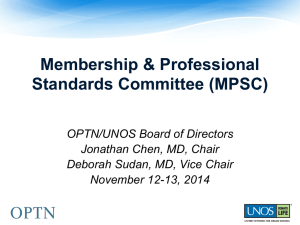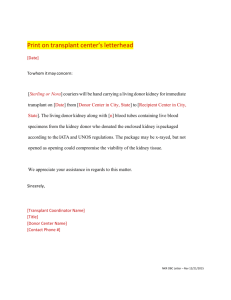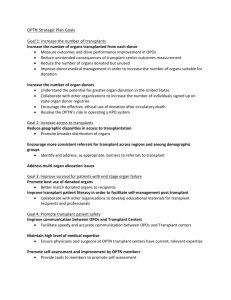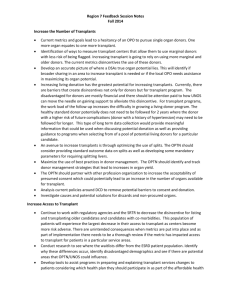MEETING SUMMARY Region 4 Meeting December 2, 2011 A
advertisement
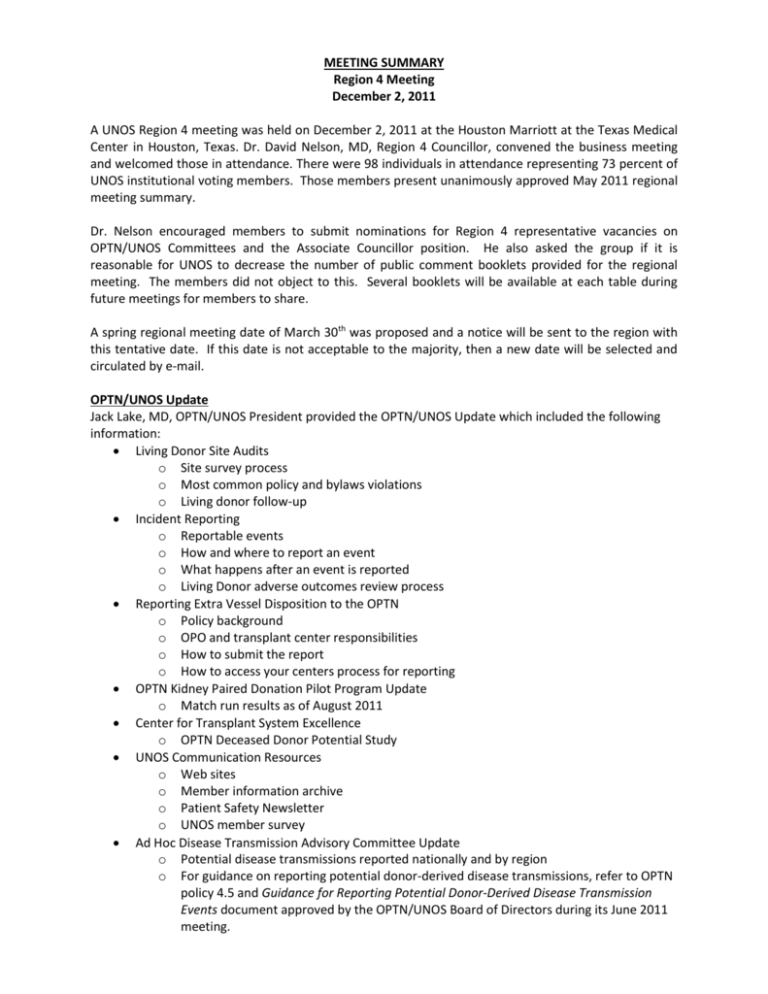
MEETING SUMMARY Region 4 Meeting December 2, 2011 A UNOS Region 4 meeting was held on December 2, 2011 at the Houston Marriott at the Texas Medical Center in Houston, Texas. Dr. David Nelson, MD, Region 4 Councillor, convened the business meeting and welcomed those in attendance. There were 98 individuals in attendance representing 73 percent of UNOS institutional voting members. Those members present unanimously approved May 2011 regional meeting summary. Dr. Nelson encouraged members to submit nominations for Region 4 representative vacancies on OPTN/UNOS Committees and the Associate Councillor position. He also asked the group if it is reasonable for UNOS to decrease the number of public comment booklets provided for the regional meeting. The members did not object to this. Several booklets will be available at each table during future meetings for members to share. A spring regional meeting date of March 30th was proposed and a notice will be sent to the region with this tentative date. If this date is not acceptable to the majority, then a new date will be selected and circulated by e-mail. OPTN/UNOS Update Jack Lake, MD, OPTN/UNOS President provided the OPTN/UNOS Update which included the following information: Living Donor Site Audits o Site survey process o Most common policy and bylaws violations o Living donor follow-up Incident Reporting o Reportable events o How and where to report an event o What happens after an event is reported o Living Donor adverse outcomes review process Reporting Extra Vessel Disposition to the OPTN o Policy background o OPO and transplant center responsibilities o How to submit the report o How to access your centers process for reporting OPTN Kidney Paired Donation Pilot Program Update o Match run results as of August 2011 Center for Transplant System Excellence o OPTN Deceased Donor Potential Study UNOS Communication Resources o Web sites o Member information archive o Patient Safety Newsletter o UNOS member survey Ad Hoc Disease Transmission Advisory Committee Update o Potential disease transmissions reported nationally and by region o For guidance on reporting potential donor-derived disease transmissions, refer to OPTN policy 4.5 and Guidance for Reporting Potential Donor-Derived Disease Transmission Events document approved by the OPTN/UNOS Board of Directors during its June 2011 meeting. National Committee Reports Those regional representatives in attendance presented synopses of national committee deliberations. The participants actively discussed many of the issues raised during these reports. Fourteen items recently circulated for public comment were considered and the following recommendations agreed upon: Kidney Transplantation Eileen Brewer, MD Proposal to Clarify Requirements for Waiting Time Modification Requests Current OPTN/UNOS policies for submitting waiting time modification requests are not clear, leading to wasted time for the transplant centers that submit requests, for OPTN Contractor staff who process requests, and for the Committees that review requests. Required documentation is often missing and results in delays for transplant candidates to receive the waiting time that they may be entitled to receive under OPTN policy. With these proposed clarifications, the Committee expects to see fewer submissions of incomplete requests and faster time to implementation of approved requests. Region 4 Vote: 26 yes, 0 no, 0 abstentions Kidney Committee Presentation: Dr. Brewer presented a brief summary of the proposed components of a new kidney allocation system. The region unanimously approved a motion to write a memorandum to the Kidney Committee indicating Region 4’s disapproval of the use of dialysis time prior to listing in a new kidney allocation system. Dr. Osama Gaber will submit a letter on behalf of the region. Liver and Intestinal Organ Transplantation Kenneth Washburn, MD Proposal to Extend the “Share 15” Regional Distribution Policy to “Share 15 National” The Committee is proposing an extension of the current “Share 15 Regional” policy so that deceased donor livers (age 18 and higher) would be offered to all candidates with MELD/PELD scores of 15 or higher locally, regionally, and nationally before being offered to candidates with lower MELD/PELD scores. Region 4 Vote: 23 yes, 2 no, 1 abstention Proposal for Regional Distribution of Livers for Critically Ill Candidates This proposal would offer livers to combined local and regional candidates with MELD/PELD scores of 35 or higher (“tiered regional sharing”). Region 4 Vote: 16 yes, 9 no, 2 abstentions Regional Comments: Region 4 was supportive of this proposal but several members were of the opinion that a sharing threshold needs to be incorporated into the proposed policy. Following are comments brought forward during a lengthy discussion: How many livers can be expected to leave each DSA in Region 4 based on this policy? Several members commented that livers will be criss-crossing the region for a difference of one MELD point. Finances are also something to consider. The committee may find unintended consequences of this proposal during its review post implementation, and in order to modify liver allocation computer programming will need to occur which will be a lengthy process while candidates continue to be disadvantaged. This proposal may disenfranchise small liver programs. Cities with larger populations will draw livers away from smaller geographic areas. The committee needs to account for exceptions in this proposal. The region voted to approve an amendment to add a sharing threshold to the proposal (vote: 16 yes, 2 no, 1 abstention). Thoracic Organ Transplantation Dan Meyer, MD Plain Language Modifications to the Adult and Pediatric Heart Allocation Policies, Including the Requirement of Transplant Programs to Report in UNet a Change in Criterion or Status within TwentyFour Hours of that Change The OPTN contractor’s policy evaluation plan requires that heart transplant programs record in UNetSM changes to a heart transplant candidate’s status or criterion within 24 hours, but this requirement is not written in Policies 3.7.3 (Adult Candidate Status) and 3.7.4 (Pediatric Candidate Status). The two policies state that the OPTN contractor will notify “a responsible member of the transplant team” prior to downgrading a candidate’s Status, but the OPTN contractor does not notify such personnel in addition to displaying the candidate’s status in UNet℠. The proposed modification includes the 24-hour requirement, removes of the notification clause, and includes edits for plain language. For consistency, the modifications also include language about potential referral of pediatric heart status exception case decisions to the Thoracic Organ Transplantation Committee. Region 4 Vote: 20 yes, 0 no, 0 abstentions Ad Hoc International Relations and Ethics Marian O’Rourke, RN, CCTC Proposed Revisions to and Reorganization of Policy 6.0 (Transplantation of Non-Resident Aliens), Which Include Changes to the Non-Resident Alien Transplant Audit Trigger Policy and Related Definitions This proposal clarifies the data collected about the citizenship and residency of donors and recipients. The proposal also amends the audit trigger policy, allowing the Ad Hoc International Relations Committee to review the circumstances of any transplant of non-US residents/non-US citizens and make a public report. The proposal also contains technical amendments and removal of requirements that are not enforceable. Region 4 Vote: 16 yes, 5 no, 0 abstentions Regional Comments: The region supported this proposal but a couple members commented that this proposal introduces increased oversight in this area and that centers will be under increased scrutiny regarding international patients that they decide to list. Histocompatibility Geoffrey Land, PhD, HCLD Proposed Update to the Calculated PRA (CPRA) The purpose of this proposal is to update CPRA so it can better reflect current lab practices as well the current donor pool. These revisions include updating the HLA frequencies used to calculate CPRA, the addition of the antigen C to the calculation and the removal of zero (0) as a default value. Region 4 Vote: 19 yes, 0 no, 0 abstentions Regional Comments: The region approved the proposal but noted that UNOS should consider adding HLA-DPB1 frequencies to the CPRA calculation and that it should be programmed with the proposed changes as it is inevitable that those frequencies will also be included eventually. DPB1 antibodies occur in sensitized renal patients as often, if not more often, than HLA-C antibodies and are responsible for both acute and accelerated graft rejection. The failure to include those specificities in the CPRA creates a situation that is inequitable for those sensitized patients in comparison with other sensitized patients in the same way that the failure to include HLA-C antibodies has been. The committee should also consider requiring HLA laboratories to type potential deceased donors for their DPB1 types and subsequently provide HLA laboratories the opportunity to enter donor DPB1 types in UNet. Currently, transplant programs that receive offers for patients with known strong antibodies to DPB1 have to obtain donor tissue and DPB1 type the donors in their own HLA laboratories, thus delaying allocation in some cases. Revision of the UNOS Bylaws, the OPTN Bylaws and the OPTN Policies that Govern HLA Laboratories This proposal revises the UNOS Bylaws and Policies that apply to histocompatibility laboratories to more closely align OPTN/UNOS requirements for member laboratories with current laboratory practices. Region 4 Vote: 19 yes, 2 no, 0 abstentions Regional Comments: The region supported the proposal but a couple members commented that it seems unnecessary to delete the standards relating to chimerism solely because it is not routinely used in many UNOS laboratories. That testing is not only used in UNOS laboratories to occasionally document the donor-source of cells causing graft versus host disease after organ transplant, but also to document chimerism that may be related to the induction of donor-specific tolerance either by chance or because of protocols that deliberately try to create chimerism by infusing donor bonemarrow derived cells. Being that it takes years to obtain approval for new policies and bylaws it seems very short-sighted to delete important standards now simply because they are only used in a few laboratories; it is certainly possible that if specific tolerance inducing protocols are found to be very successful such testing will be far more widely used in the future. Chimerism testing is also routinely used after composite tissue (e.g., hand) transplants since that type of transplant almost always also includes transplant of bone containing donor hematopoietic stem cells. Living Donor Steven Potter, MD, FACS Proposal to Establish Requirements for the Informed Consent of Living Kidney Donors This proposal would establish policy requirements for the informed consent of living kidney donors. This proposal is in response to a directive from the Health Resources and Services Administration (HRSA) and based on recommendations from a Joint Societies Steering Committee composed of representatives of the American Society of Transplantation (AST); the American Society of Transplant Surgeons (ASTS); and the North American Transplant Coordinators Organization (NATCO) to the OTPN/UNOS Living Donor Committee. Region 4 Vote: 20 yes, 0 no, 0 abstentions Proposal to Establish Minimum Requirements for Living Kidney Donor Follow-up This proposal would require transplant programs to report required fields on the Living Donor Follow-up (LDF) form at required post-operative reporting periods (6, 12, and 24 months). The OPTN currently relies on Living Donor Follow-up (LDF) forms to collect data on the short-term health status of living donors. Data on living donors who donated in 2006 through 2009 demonstrate that many programs do not report meaningful living donor follow-up information at required reporting intervals. Consequently, to allow for meaningful analyses to objectively study the short-term effects of living donation, the transplant community must collectively improve patient information on the LDF form. The proposed minimum reporting requirements are based on recommendations from the Joint Society Work Group, which is composed of representatives from the American Society of Transplantation (AST), the American Society of Transplant Surgeons (ASTS), and the North American Transplant Coordinators Organization (NATCO) to the OPTN/UNOS Living Donor Committee. Region 4 Vote: 0 yes, 16 no, 0 abstentions Regional Comments: The region did not support this proposal as the members think that a 90% threshold is not a realistic target. Another member commented that the data shared on compliance rates was from 2008 and that kidney programs have improved regarding submission of living donor follow-up forms since that time and this needs to be taken into consideration. Several members also noted that some donors don’t wish to be followed post donation. The region overall strongly believes that following living donors is the right thing to do, but that attaining the 90% threshold is not realistic. The region approved an amendment to document the attempts that were made to contact living donors. In the event that a center falls below the 90% threshold, the center could provide the OPTN with documentation of attempts to contact each living donor who does not have the required follow-up information (vote: 23 yes, 0 no, 0 abstentions). Proposal to Establish Requirements for the Medical Evaluation of Living Kidney Donors This proposal would establish policy requirements for the medical evaluation of living kidney donors. This proposal is in response to a directive from the Health Resources and Services Administration (HRSA), and based on recommendations from a Joint Societies Steering Committee composed of representatives of the American Society of Transplantation (AST); the American Society of Transplant Surgeons (ASTS) and the North American Transplant Coordinators Organization (NATCO) to the Living Donor Committee. Region 4 Vote: 15 yes, 2 no, 2 abstentions Organ Procurement Organization Patrick Giordano, FACHE Proposal to Eliminate the Use of an “Alternate” Label when Transporting Organs on Mechanical Preservation Machines and to Require the OPTN Distributed Standardized Label This proposal would make labeling of these machines consistent for all deceased and living donor organs that are transported outside of donor hospitals. Current policy allows the use of an “alternate” label, or a label other than the OPTN standardized label, when transporting organs on a mechanical preservation machine. OPOs create their own alternate labels resulting in inconsistent labeling. The proposed policy changes eliminate the use of alternate shipping labels on mechanical preservation machines and require OPOs to use a new standardized label that is part of the current color-coded labeling system distributed by the OPTN contractor. Region 4 Vote: 23 yes, 0 no, 0 abstentions Proposal to Change the Term “Consent” to “Authorization” Throughout Policy When Used in Reference to Organ Donation The proposed modification will change the term "consent" to "authorization" throughout policy when used in reference to deceased organ donation. Currently, OPTN policy uses the term “consent” to describe the act of making an anatomical gift. However, the public associates “consent” with the medico-legal concept of “informed consent” through which physicians must give patients all the information they need to understand the risks, benefits, and costs of a particular medical treatment. In the context of organ/tissue/eye donation after death, this blending of terms leads to misunderstandings about the act of donation that could hinder our national goal of increasing organ/tissue/eye donation and transplantation. The OPO community has responded to this circumstance by changing the donation terminology from “consent” to “authorization.” This change focuses attention on the altruistic act of donation and reinforces the fact that donation after death does not involve medical treatment. Region 4 Vote: 23 yes, 0 no, 0 abstentions Proposal to Modify the Imminent and Eligible (I & E) Neurological Death Data Reporting Definitions The proposed policy changes clarify the definitions for determining whether a death can be classified as “imminent” or “eligible.” OPOs are responsible for reporting data that classify a death as either an Imminent Neurologic Death (“imminent,”) or Eligible Death (“eligible,”) or neither “eligible” nor “imminent” (“neither.”) The OPOs then report the “imminent” and “eligible” deaths to the OPTN. There are inconsistencies in the data reporting which have been primarily attributed to: OPOs interpreting the definitions in Policy 7.1 (Reporting Definitions) differently, and Brain death laws varying from state to state affecting the way the deaths are reported. The Committee eliminated Multi-system organ failure as an exclusionary criteria for classifying a death as ”eligible”, and identified a list of organ specific exclusionary criteria that has been added to provide more detailed guidance. The Committee also made changes to the definition of “imminent” so that it is restricted to those deaths that would most likely be classified as “eligible” had brain death been legally declared. This could allow the combination of “eligible” and “imminent” deaths to mitigate the effect of the variation in brain death laws. Region 4 Vote: 16 yes, 3 no, 0 abstentions Regional Comments: Region 4 supported the proposal, but a member offered the following comment: This proposal may lead to increased costs for the OPO as the OPO conducts additional tests to place organs from a marginal donor who by definition is an eligible donor. For example, when an OPO persues an eligible donor and places one organ and after the organ is recovered the transplant center who initially accepted it now declines and with increased cold ischemic time the organ cannot be allocated. This donor remains an eligible donor yet no organs were allocated. Policy Oversight Meelie DebRoy, MD Proposal to Clarify and Improve Variance Policies This proposal streamlines and clarifies requirements for review and approval of variances, including gathering all requirements into one policy category for the variance application, review, approval, modification, dissolution, and appeal processes; detailing the process for appealing a variance decision of the Committee or Board of Directors; eliminating redundancy in existing variance policies; and rewriting the variance policies using plain language. Region 4 Vote: 21 yes, 0 no, 0 abstentions Committee reports: Transplant Administrators Katherine Stark, MHSA Pancreas John Duffy, MD Operations and Safety Dean Henderson, MHA Minority Affairs Sherilyn Gordon Burroughs, MD Membership and Professional Standards Marlon Levy, MD, FACS Finance Stephan Moore, MHA New Business With no further business, the meeting was adjourned.
